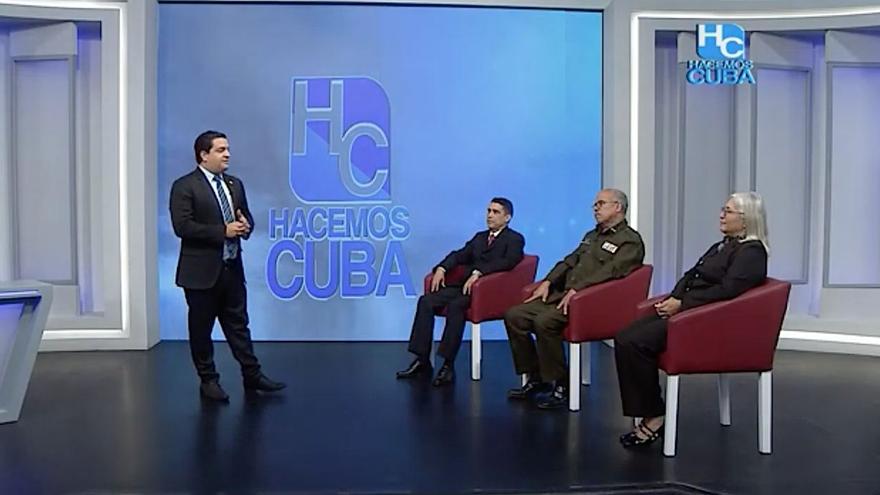
![]() 14ymedio, Havana, December 20, 2023 — “Terrorists and their accomplices seek to colonize our minds,” was one of the many exalted statements of the spokesman for the Humberto López regime during this Tuesday’s broadcast of the program Hacemos Cuba. How do we hunt and execute those “declared enemies of the Revolution“? What legal mechanisms can guarantee the extradition from the United States of “criminals” such as Alexander Otaola and Orlando Gutiérrez Boronat? Can the “list of terrorists” published on December 7 continue to grow?
14ymedio, Havana, December 20, 2023 — “Terrorists and their accomplices seek to colonize our minds,” was one of the many exalted statements of the spokesman for the Humberto López regime during this Tuesday’s broadcast of the program Hacemos Cuba. How do we hunt and execute those “declared enemies of the Revolution“? What legal mechanisms can guarantee the extradition from the United States of “criminals” such as Alexander Otaola and Orlando Gutiérrez Boronat? Can the “list of terrorists” published on December 7 continue to grow?
To answer these questions, López invited three ideal interlocutors to the set: Pilar Varona, Deputy Minister of Justice; Marcos Caraballo, Deputy Attorney General of the Republic, and Francisco Estrada, the lieutenant colonel who heads the State Security Investigation Body.
The presenter asked the Deputy Minister of Justice to emphasize the importance of the list, published in the Gaceta Oficial. Varona answered that the text’s appearing in that publication “gives it a legal weight,” he said, which helps to accentuate the rigor.
The presenter asked the Deputy Minister of Justice to emphasize the importance of the list’s appearing in the ’Gaceta Oficial’
Estrada Portales dusted off the State Security videos about the 1999 explosions in several hotels. There is no problem that more than 20 years have passed since those events, Deputy Prosecutor Caraballo clarified: on Guillermo Novo, Pedro Crispín and José Hernández – three of the names at the top of the list – the weight of the law can fall “at any time.”
Despite validating every name on the list, López decided that many were ancient history and preferred to move forward to 2020, with the cases of Iván Leyva and Jorge Fernández, residents outside the Island accused of carrying out “sabotage of the national energy system.” “Let’s record these names,” stressed the regime’s spokesman; “we have evidence.”
López has no problem quoting himself in previous broadcasts of Hacemos Cuba, showing the televised interrogations he conducted on some “terrorists.” According to the presenter, the confessions of people who were financed by Leyva and Fernández are enough to condemn them. The images “are still shocking,” he said.
State Security has in its power material to charge numerous people, said the lieutenant colonel, both detained and outside the country.
The presenter recited with emphasis the names of Otaola, Eliécer Ávila, Gutiérrez Boronat, Jorge Ramón Batista Calero and Alain Sánchez, among others, about whom he asked the deputy prosecutor if they incurred the crime of terrorism or if they simply exercised their freedom of expression. “That right is not absolute; it has limits,” Caraballo insisted. “There is no doubt: new technologies can become a scenario for committing terrorist and violent acts.”
As for the influencer Batista Calero, known as Ultrack, López took him as an example of clear terrorist behavior, for his call to “kill the Castro leadership.” The crime, Estrada theorized, is not just in committing the act, but in “the instigation” and “participation” in groups on social networks, “replicating the incitement.” It is a straight path to “receiving financing,” sooner or later.
Are they going to be investigated even though all they have done is communicate?” López asked. The deputy prosecutor’s response was yes
“Are they going to be investigated even though all they have done is communicate?” López asked. The deputy prosecutor’s response was yes. The Constitution provides for a “wide range” of participation in crimes, “even if a concrete result does not occur.”
The phrase of the day was “international criminal assistance,” the series of mechanisms by which Cuba intends to appeal to “guarantee an effective confrontation” against “terrorists.” Several countries “have cooperated with Cuba” to send people of interest that Havana has asked for – the deputy prosecutor did not say who. Interpol “circulated with red notification” to 12 members of the list, said the representative of State Security. Those people are now in Cuba, in the middle of their legal process.
However, even if the international authorities do not listen to Cuba’s demands, the members of the list can always be “judged in absentia.” The deputy prosecutor recalled that among the punishments are life imprisonment and the death sentence. The slogan is to “persecute, repress and punish” those whom the Government considers terrorists, stressed the Deputy Minister of Justice in the last minutes of the program.
He betrayed the star spokesman of the regime, however, with a careless allusion to the “desire and imagination” of State Security when it comes to calling terrorists those who “come up again and again” in the investigations. The lieutenant colonel ignored the slip: “Those names will go on the list,” he warned.
Translated by Regina Anavy
____________
COLLABORATE WITH OUR WORK: The 14ymedio team is committed to practicing serious journalism that reflects Cuba’s reality in all its depth. Thank you for joining us on this long journey. We invite you to continue supporting us by becoming a member of 14ymedio now. Together we can continue transforming journalism in Cuba.
